- Get link
- X
- Other Apps
This is the price we are paying for the aggression of the USA.......











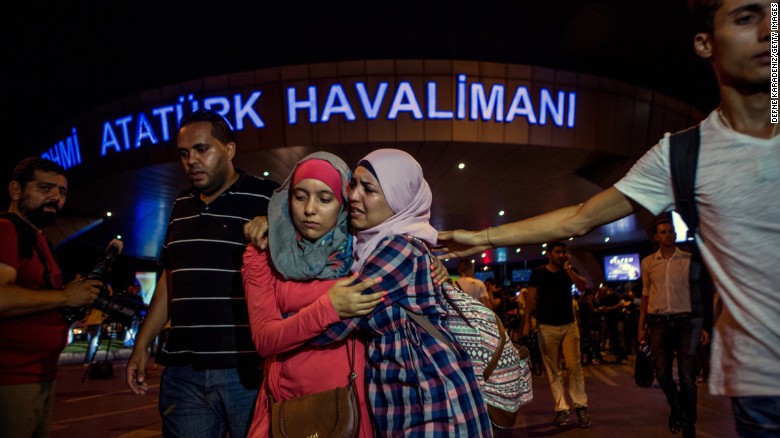
































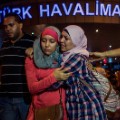
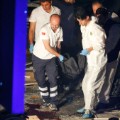
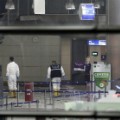
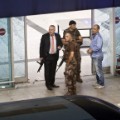
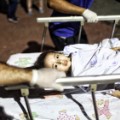
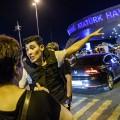
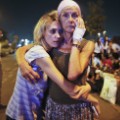
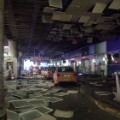
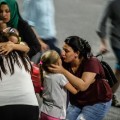
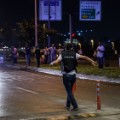
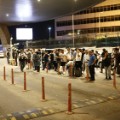

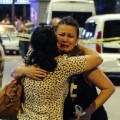
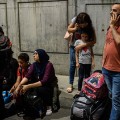
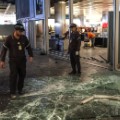
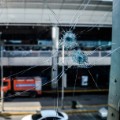

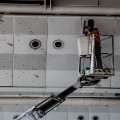
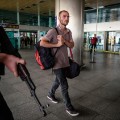
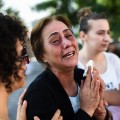
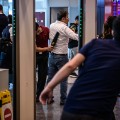
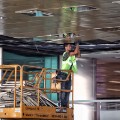
ISIS' Ramadan terror campaign
Story highlights
- Peter Bergen says an ISIS spokesman called for attacks during the holy month
- ISIS has been suffering reverses on the ground militarily
Peter Bergen is CNN's national security analyst, a vice president at New America and a professor of practice at Arizona State University. He is the author of the new book, "United States of Jihad: Investigating America's Homegrown Terrorists."
(CNN)In the past two days, ISIS has conducted lethal suicide attacks in Jordan, Lebanon, Yemen and also, very likely, in Turkey.
Referring to Tuesday's suicide bombings at the Istanbul Ataturk Airport that killed dozens, a U.S. government official told me there is "no reason to think it isn't ISIS." The official also noted that the airport is "not a typical PKK target," using the initials of a Kurdish group that also has carried out a number of recent terrorist attacks in Turkey.
And Turkish Prime Minister Binali Yildirim said early signs point to ISIS. Still, ISIS has not claimed responsibility and it's not certain that it was behind the Istanbul attacks, which are the mostlethal terrorist attacks ever at an airport.

Photos: Istanbul airport attacked
A wounded woman talks on the phone following the attack.
Hide Caption
12 of 22
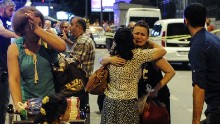
Photos: Istanbul airport attacked
Passengers cry as they leave the airport.
Hide Caption
13 of 22
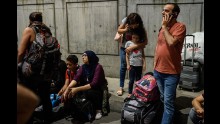
Photos: Istanbul airport attacked
People on their phones wait with their luggage outside the airport.
Hide Caption
14 of 22
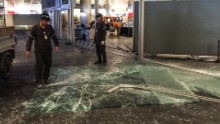
Photos: Istanbul airport attacked
Workers clear glass debris on the day after the attack.
Hide Caption
15 of 22
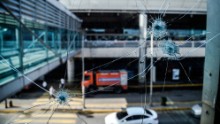
Photos: Istanbul airport attacked
Bullet holes are seen at the airport on Wednesday, June 29.
Hide Caption
16 of 22

Photos: Istanbul airport attacked
Hide Caption
17 of 22
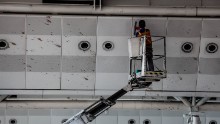
Photos: Istanbul airport attacked
A worker cleans blood from the upper walls of the international departure terminal.
Hide Caption
18 of 22
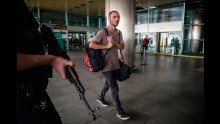
Photos: Istanbul airport attacked
A police officer stands guard as a man walks at the airport a day after the attack.
Hide Caption
19 of 22
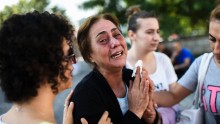
Photos: Istanbul airport attacked
A woman cries in Istanbul on June 29.
Hide Caption
20 of 22
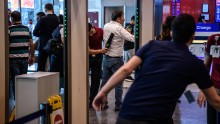
Photos: Istanbul airport attacked
Security personnel scan passengers and employees at a checkpoint on June 29.
Hide Caption
21 of 22
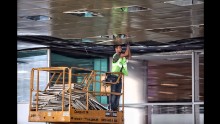
Photos: Istanbul airport attacked
A worker repairs the airport's damaged ceiling on June 29.
Hide Caption
22 of 22
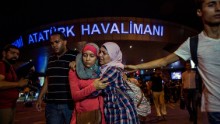
Photos: Istanbul airport attacked
People flee the scene of a terror attack at Istanbul's Ataturk airport on Tuesday, June 28. Three terrorists armed with bombs and guns attacked the main international terminal, opening fire and eventually detonating their devices.
Hide Caption
1 of 22
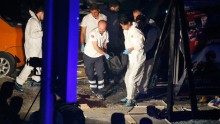
Photos: Istanbul airport attacked
Investigators remove a body after the attack.
Hide Caption
2 of 22
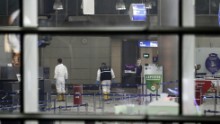
Photos: Istanbul airport attacked
Police investigators work inside the airport.
Hide Caption
3 of 22
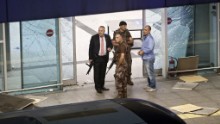
Photos: Istanbul airport attacked
Turkish special forces secure an area of the airport after the attack.
Hide Caption
4 of 22
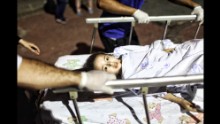
Photos: Istanbul airport attacked
A wounded girl is taken to a hospital in Istanbul.
Hide Caption
5 of 22
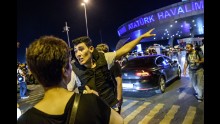
Photos: Istanbul airport attacked
A Turkish police officer directs a passenger at the airport.
Hide Caption
6 of 22
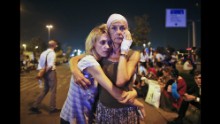
Photos: Istanbul airport attacked
Travelers embrace outside the airport.
Hide Caption
7 of 22
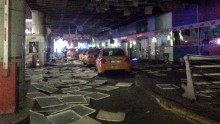
Photos: Istanbul airport attacked
One of the bombs was located just outside the international terminal on the pavement, Turkish Justice Minister Bekir Bozdag told CNN. Another was at the security gate at the entrance to the airport.
Hide Caption
8 of 22
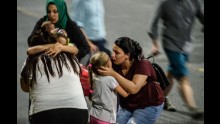
Photos: Istanbul airport attacked
Children and their relatives embrace after reuniting outside the airport.
Hide Caption
9 of 22
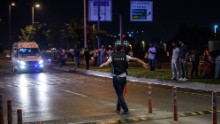
Photos: Istanbul airport attacked
A police officer sets up a security perimeter.
Hide Caption
10 of 22
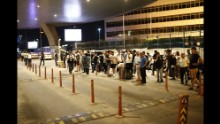
Photos: Istanbul airport attacked
People stand outside the airport after the attack.
Hide Caption
11 of 22

Photos: Istanbul airport attacked
A wounded woman talks on the phone following the attack.
Hide Caption
12 of 22

Photos: Istanbul airport attacked
Passengers cry as they leave the airport.
Hide Caption
13 of 22

Photos: Istanbul airport attacked
People on their phones wait with their luggage outside the airport.
Hide Caption
14 of 22

Photos: Istanbul airport attacked
Workers clear glass debris on the day after the attack.
Hide Caption
15 of 22

Photos: Istanbul airport attacked
Bullet holes are seen at the airport on Wednesday, June 29.
Hide Caption
16 of 22

Photos: Istanbul airport attacked
Hide Caption
17 of 22

Photos: Istanbul airport attacked
A worker cleans blood from the upper walls of the international departure terminal.
Hide Caption
18 of 22

Photos: Istanbul airport attacked
A police officer stands guard as a man walks at the airport a day after the attack.
Hide Caption
19 of 22

Photos: Istanbul airport attacked
A woman cries in Istanbul on June 29.
Hide Caption
20 of 22

Photos: Istanbul airport attacked
Security personnel scan passengers and employees at a checkpoint on June 29.
Hide Caption
21 of 22

Photos: Istanbul airport attacked
A worker repairs the airport's damaged ceiling on June 29.
Hide Caption
22 of 22

Photos: Istanbul airport attacked
People flee the scene of a terror attack at Istanbul's Ataturk airport on Tuesday, June 28. Three terrorists armed with bombs and guns attacked the main international terminal, opening fire and eventually detonating their devices.
Hide Caption
1 of 22

Photos: Istanbul airport attacked
Investigators remove a body after the attack.
Hide Caption
2 of 22

Photos: Istanbul airport attacked
Police investigators work inside the airport.
Hide Caption
3 of 22

Photos: Istanbul airport attacked
Turkish special forces secure an area of the airport after the attack.
Hide Caption
4 of 22

Photos: Istanbul airport attacked
A wounded girl is taken to a hospital in Istanbul.
Hide Caption
5 of 22

Photos: Istanbul airport attacked
A Turkish police officer directs a passenger at the airport.
Hide Caption
6 of 22

Photos: Istanbul airport attacked
Travelers embrace outside the airport.
Hide Caption
7 of 22

Photos: Istanbul airport attacked
One of the bombs was located just outside the international terminal on the pavement, Turkish Justice Minister Bekir Bozdag told CNN. Another was at the security gate at the entrance to the airport.
Hide Caption
8 of 22

Photos: Istanbul airport attacked
Children and their relatives embrace after reuniting outside the airport.
Hide Caption
9 of 22

Photos: Istanbul airport attacked
A police officer sets up a security perimeter.
Hide Caption
10 of 22

Photos: Istanbul airport attacked
People stand outside the airport after the attack.
Hide Caption
11 of 22






















In the past month, we've seen a surge of terrorism in the Middle East and the West.
None of this should be too surprising. After all, ISIS explicitly called for terrorist attacks during the holy month of Ramadan, which commenced three weeks ago.
Abu Muhammad al-Adnani, the spokesman for ISIS, released an audiotape in late May in whichhe called for attacks, saying, "Ramadan, the month of conquest and jihad... make it a month of calamity everywhere for the non-believers."
Beginning on Monday, ISIS or its affiliated groups started carrying out multiple attacks across the Middle East. ISIS suicide attackers blew themselves up in a Christian village in Lebanon close to the Syrian border, killing five people.
Also on Monday, a wave of ISIS suicide attacks in Yemen in the southeastern city of Mukalla killed more than 40.
On Tuesday, ISIS launched a suicide attack that killed seven Jordanian security personnel at a border crossing between Jordan and Syria.
The same day, the Istanbul airport was attacked by three suicide bombers who were likely dispatched by ISIS.
In the past two and half weeks, ISIS-inspired attackers also struck in the West, first in Orlando, Florida, where 49 people were killed in a gay nightclub -- the most lethal terrorist attack in the United States since 9/11 -- and, the day after the Orlando attack, an ISIS terrorist killed a police official and his partner in a town outside Paris.
Unfortunately, we may see more attacks. For Islamist terrorist groups such as ISIS, the holy month of Ramadan -- a time of fasting and prayer for the vast majority of Muslims -- is seen as a particularly auspicious time to launch terrorist attacks.
This is especially the case around the 27th day of Ramadan, the "Night of Power," which is a particularly sacred day for the world's Muslims as it was the time that the Prophet Mohammed started receiving the first verses of the Koran.
On the Night of Power in 2000, which that year fell on January 3, al Qaeda militants attempted to launch a suicide attack against the American warship USS The Sullivans off the coast of Yemen with a bomb-filled boat. The attack failed. This year, the 27th day of Ramadan will fall on July 2.
If indeed the attacks at Istanbul's airport are the work of ISIS, it would fit into the terrorist organization's current strategy to attack commercial aviation targets. In March, two ISIS suicide bombers launched the attacks at the Brussels airport that killed 15.
In October, ISIS' Egyptian affiliate brought down a Russian commercial jet leaving Sinai airport, killing all 224 people on board, the deadliest attack on commercial aviation since 9/11.
ISIS also has ample motivation to want to attack Turkey. Where the Turks once had a laissez-faire attitude to the tens of thousands of "foreign fighters" who have transited Turkey to join ISIS in neighboring Syria, now the Turks have substantially cut down on ISIS recruits traveling though their country.
In 2015, ISIS, in one of its English language online publications, advised would-be foreign fighters hoping to join the group that, "Turkish intelligence agencies are in no way friends of the Islamic State [ISIS]."
Turkey has also allowed the United States to fly bombing missions aimed at ISIS from airports on Turkish soil.
Not coincidentally, the latest wave of attacks comes as ISIS continues to suffer reversals on the battlefield in both Iraq and Syria. Indeed, last week Gen. David Petraeus, the former U.S. commanding general in Iraq, predicted in an interview with me that ISIS could lose its de facto capital, the important Iraqi city of Mosul, before the end of the Obama administration's term in January 2017.
Such battlefield losses may serve to accelerate ISIS-directed and -inspired attacks outside of Iraq and Syria.
- Get link
- X
- Other Apps











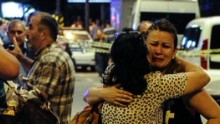
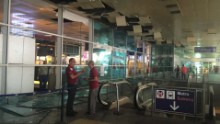

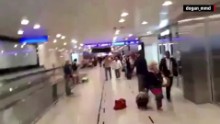
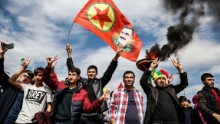



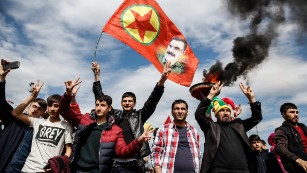
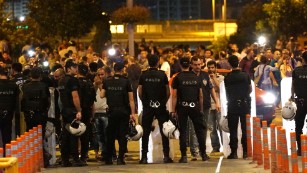
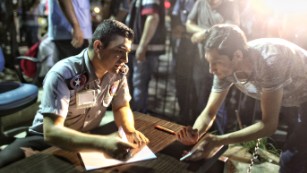
Comments
Post a Comment